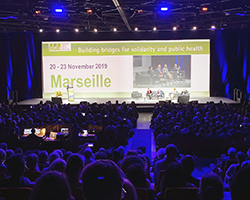Building bridges for public health

European Public Health Conference
Building bridges for solidarity and public health was the focus of this year’s European Public Health (EPH) Conference organized by the European Public Health Association with the Société Française de Santé Publique, where attendees from WHO/Europe contributed on a range of topics from achieving the Sustainable Development Goals (SDGs) to migrant health.
The 12th EPH Conference, held in Marseille, France, brought together public health professionals from across Europe. This followed the 2018 conference in Ljubljana, Slovenia, where a plan was agreed to implement the 2030 Agenda for Sustainable Development.
WHO’s Regional Director for Europe nominee, Dr Hans Kluge, addressed both the opening ceremony and the first plenary session, explaining that the aim of building bridges “for equity and solidarity in health is one that is truly close to my heart, since it embodies my values and my vision for WHO”.
Recounting his meetings with health ministers, Dr Kluge highlighted that while there is an understanding of what needs to be done, the real challenge lies in how to implement the SDGs. With this aim, building bridges with partners is vital: “WHO has a unique role to play but it is entirely clear that we cannot expect to achieve it all alone”.
Building on the evidence base
Bridges also need to be built with policy-makers, particularly around communicating the existing evidence base.
WHO/Europe’s Evidence and Intelligence for Policy-making team led various events on health literacy, helping health professionals develop the necessary skills in advocating for evidence to policy-makers – particularly through the Evidence-informed Policy Network (EVIPNet). Further sessions covered the theme of behavioural insights, most notably understanding how certain behaviours can influence the delivery of health care.
Well-attended workshops were held by the Regions for Health Network (RHN): making the case for health equity and the use of health impact assessments, and explaining how to translate evidence into “digestible” pieces that can be incorporated into health policies. Separately, RHN launched a report on the versatility of health impact assessment in Andalusia and other parts of the WHO European Region.
Looking ahead
On the question of the future of public health within the European Union (EU), the European Observatory on Health Systems and Policies contributed to a plenary session with a focus on the role of EU institutions in ensuring that health is addressed in all EU policies.
In other sessions, the European Observatory held a preconference event discussing how skills building can enhance collaboration between primary health care and public health, as well as a joint session with the European Commission on improving vaccination coverage, and other events focusing on quality in health care.
A separate plenary in collaboration with WHO/Europe focused on challenging social inequalities and ensuring migrant inclusion. This plenary included a presentation on the policies of WHO/Europe and how they are being implemented by Member States. Particular attention was drawn to the importance not only of the work within the health sector, which was needed to improve the health of refugees and migrants living in urban settings, but also the intersectoral collaboration needed to implement the regional and global strategies set forth.
The 13th EPH Conference will form an integral part of the 16th World Congress on Public Health, to be held in Rome in October 2020.



